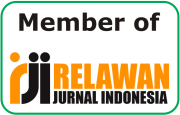The Role of the KPK TikTok Account in Building Anti-Corruption Awareness in South Kalimantan
Abstract
Corruption is a serious threat in Indonesia that hinders development and harms society, thus requiring various approaches for its mitigation, including through social media. The Corruption Eradication Commission (KPK) utilizes the TikTok platform to raise public awareness, especially in South Kalimantan, about the dangers of corruption and its prevention. This study aims to explore the role of the KPK's TikTok account in building anti-corruption awareness in the region and its impact on public perception. Using a literature review approach with a descriptive qualitative methodology, this research analyzes relevant sources, including journals, articles, and previous research reports. The findings show that TikTok has become an effective tool in spreading anti-corruption messages, particularly to the younger generation. The campaigns carried out by the KPK through TikTok provide education, promote transparency, and support public involvement in corruption prevention efforts. Additionally, public participation on social media, integrity-based training for civil servants, and anti-corruption education in schools further strengthen this campaign. However, its effectiveness can still be enhanced through collaboration with local communities and optimization of visual content. This study provides valuable insights into how social media, particularly TikTok, can be used to support transparency and drive sustainable anti-corruption efforts in South Kalimantan.
Keywords
Full Text:
PDFReferences
Ema, Ema, and Luluatu Nayiroh. “Komunikasi Media Sosial Sebagai Alat Mobilisasi Gerakan Sosial Di Indonesia.” Jurnal Ilmu Komunikasi UHO : Jurnal Penelitian Kajian Ilmu Komunikasi Dan Informasi 9, no. 1 (January 10, 2024): 221–38. https://doi.org/10.52423/jikuho.v9i1.159.
Eun, Ji-Yong. “A Media Criticism-Based Approach for Designing Critical Multicultural Instruction in Social Studies Curricula.” Pedagogy, Culture & Society 31, no. 1 (January 2023): 129–46. https://doi.org/10.1080/14681366.2021.1891450.
Hanafi, Imam, Yahman, Rahmawati, and Muh Mahka Fahcrur Razy. Buku Referensi Pendidikan Anti Korupsi: Evaluasi Dan Pemantauan. Malang: PT. Literasi Nusantara Abadi Grup, 2023.
Hastrida, Andhini. “Process of Government Social Media Management : Benefit and Risk.” Jurnal Penelitian Komunikasi Dan Opini Publik 25, no. 2 (December 31, 2021). https://doi.org/10.33299/jpkop.25.2.3920.
Indra, Latif Nur, Filosa Gita Sukmono, and Danang Kurniawan. “The Function of Social Media in Creating Participatory Based Government Policies in Indonesia.” In Human Interaction & Emerging Technologies (IHIET 2022): Artificial Intelligence & Future Applications, Vol. 68. AHFE Open Acces, 2022. https://doi.org/10.54941/ahfe1002761.
KPK. “Tangkap Tangan Suap Proyek di Kalimantan Selatan, KPK Tetapkan 7 Tersangka.” Accessed December 11, 2024. https://kpk.go.id/.
Krisdanu, Cheryl Arshiefa, and Kiranastari Asoka Sumantri. “TikTok Sebagai Media Pemasaran Digital Di Indonesia.” Jurnal Lensa Mutiara Komunikasi 7, no. 2 (November 30, 2023): 24–36. https://doi.org/10.51544/jlmk.v7i2.4173.
Machmud, Muslimi, Jeanny Maria Fatimah, M. Iqbal Sultan, and Muhammad Farid. “Social Media As Communication Tools For Anti-Corruption Campaign In Indonesia.” International Journal of Data and Network Science 9, no. 8 (n.d.): 357–68.
Nurhayati, Anna, Riyanto Riyanto, and Moh Rif’an. “Memaksimalkan Peran Perpustakaan Sebagai Sumber Belajar Di Sekolah Menengah Atas Muhammadiyah 1 Ponorogo.” Berkala Ilmu Perpustakaan Dan Informasi 18, no. 1 (June 6, 2022): 113–27. https://doi.org/10.22146/bip.v18i1.3650.
“Pengguna TikTok Di Indonesia Terbanyak Kedua Di Dunia per April 2023, Nyaris Salip AS? | Databoks.” Accessed December 11, 2024. https://databoks.katadata.co.id/media/statistik/e55f918fb00588b/pengguna-tiktok-di-indonesia-terbanyak-kedua-di-dunia-per-april-2023-nyaris-salip-as.
Prabowo, Hendi Yogi, Rizki Hamdani, and Zuraidah Mohd Sanusi. “The New Face of People Power: An Exploratory Study on the Potential of Social Media for Combating Corruption in Indonesia.” Australasian Accounting, Business and Finance Journal 12, no. 3 (October 9, 2018). https://doi.org/10.14453/aabfj.v12i3.3.
Rethlefsen, Melissa L., Shona Kirtley, Siw Waffenschmidt, Ana Patricia Ayala, David Moher, Matthew J. Page, Jonathan B. Koffel, and Prisma-S. Group. “PRISMA-S: An Extension to the PRISMA Statement for Reporting Literature Searches in Systematic Reviews.” Journal of the Medical Library Association 109, no. 2 (July 20, 2021): 174–200. https://doi.org/10.5195/jmla.2021.962.
Rinenggo, Alil, Intan Kusumawati, Zaenul Stiyawan, and Sutiyono Sutiyono. “Anti-Corruption Education In The Family, Community, School, And State.” Academy of Education Journal 13, no. 1 (January 1, 2022): 84–102. https://doi.org/10.47200/aoej.v13i1.975.
Riwanto, Agus. “Construction Of Legal Culture Model For Corruption Prevention Through Social Media In Indonesia.” Jurnal Hukum Dan Peradilan 11, no. 3 (December 1, 2022): 385–404. https://doi.org/10.25216/jhp.11.3.2022.385-404.
Setiasih, Rini. “The Effect Of Integrity Learning Understanding Of Leadership Training Participants On Anti-Corruption Behavior Of Civil Servants In The South Kalimantan Provincial Government.” JournalNX - A Multidisciplinary Peer Reviewed Journal 7, no. 07 (July 31, 2021): 201–11. https://doi.org/10.17605/OSF.IO/ESGN8.
Suriadi, Suriadi. “Pembinaan Pendidikan Islam Pada Masa Rasulullah Saw.” BELAJEA: Jurnal Pendidikan Islam 2, no. 2 (December 28, 2017): 139–56. https://doi.org/10.29240/bjpi.v2i2.263.
Yulianita, Neni, Nurrahmawati Nurrahmawati, and Anne Maryani. “The Effect of Anti-Corruption Campaign on the Exposure Aspects on Social Media Facebook and Instagram,” 88–91. Atlantis Press, 2020. https://doi.org/10.2991/assehr.k.200225.019.
DOI: http://dx.doi.org/10.35931/aq.v19i3.4998
Refbacks
- There are currently no refbacks.
Copyright (c) 2025 Muzahid Akbar Hayat, Devi Khairunnisa

This work is licensed under a Creative Commons Attribution 4.0 International License.
Al Qalam: Jurnal Ilmiah Keagamaan dan Kemasyarakatan
index by:
Publish by:
Sekolah Tinggi Ilmu Al-Qur'an Amuntai
Contact us:
Address: Jl. Rakha Pakapuran, Amuntai Utara
Kabupaten : Hulu Sungai Utara
Kode Pos : 71471
Provinsi : Kalimantan Selatan
Telephone : 085251613000
Email: hafizhihusinsungkar@gmail.com

This work is licensed under a Creative Commons Attribution 4.0 International License


